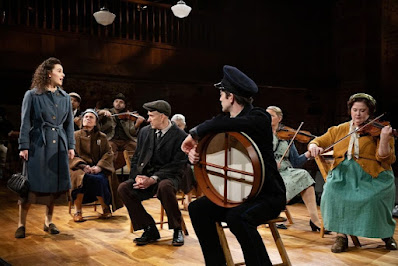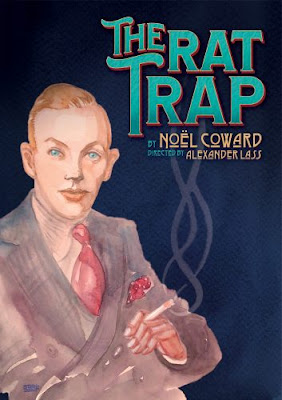11/21/22: Only Gold
What: MCC presents a new musical by Kate Nash, about a king of a small country who brings his wife and adult daughter to Paris in 1928 to prepare for his daughter's wedding, and the watchmaker-turned-jeweler and piano soloist whose lives are changed by the royal family's arrival.
And? If you look at this as strictly a dance piece (directed and choreographed by Andy Blankenbuehler) underscored by Kate Nash songs, then this is some absolutely stellar storytelling. If you look at this as a musical, you're in a bit more trouble. The dialogue (book by Blankenbuehler and Ted Malawer) is very not good. The story itself is built entirely of tropes we've seen many times over. The use of Kate Nash as narrator who sometimes (but not always) sings the characters' thoughts, feels too arbitrary a device to be an effective storytelling move. The placement in 1928 Paris feels even more arbitrary. Why are we here? Where is the evidence of a generation lost to the Great War, of a city rebuilding? What, besides the love stories, makes any of this demand to take place in France? The only reason I can see for why it takes place in a specific year is to make it clear why Camille, as a woman, feels unable to pursue her music career.
But let's be kind. Let's look at it as a dance piece underscored by Kate Nash. Then, oh boy. After hearing the pedestrian dialogue I didn't expect to invest in any of these characters' journeys, but the dances--each feeling in a way like their own individual one-acts--are a true emotional journey, a clarity of storytelling that reminds us why we love Blankenbuehler's work. This production is a true showcase for Karine Plantadit and Gaby Diaz, who play queen and princess to Terrence Mann's king. They are both utterly transcendent and vividly alive through their numbers. Heck, the whole cast is great, I just really wanted to highlight these two. I wish I could list specific songs/dances that spoke to me, but it's hard to remember the songs that were sung under the dances, so even a title list doesn't help me here. From a theater historian standpoint, it's rather charming that though Terrence Mann is cast in one of the three non-dancing roles, he still comes from a dance background (early projects for him include OBC Cats and the film of A Chorus Line); and luckily he also gets to have a great musical catharsis singing--he may not dance anymore, but his voice is still as wonderful as ever. And the framework for the space is lovely too: Jeff Croiter knows how to light dancers to show off their beauty and grace, and they glow against David Korins's romantic coppery scenic design.
11/22/22: A Man of No Importance
What: Classic Stage presents a revival of the McNally, Ahrens, and Flaherty musical about a bus conductor in Dublin, closeted and enamored of the works of Oscar Wilde, trying to stage a community production of Salome.
And? I think this musical just isn't for me. The production is fine, with some flaws (the flaws: the accent work is turrible, and the sound design isn't a lot better--I struggled to hear the cast over the instruments, and I was in the front row), but it's just not for me. John Doyle is a great actor's director, giving us fully realized humans onstage, which I always value. Jim Parsons gives a subtle and understated performance as Alfie, quietly sad and quietly hopeful. Thom Sesma, always solidly good, is a hammy delight as the butcher turned theater actor. A.J. Shively is dopeishly sweet as bus driver Robbie Fay, but the orchestrations by Bruce Coughlin don't allow his big song, "The Streets of Dublin," to soar the way it needs to. A really lovely thing to note: there is fantastic body diversity in this production, and the costume design by Ann Hould-Ward outfits them all beautifully. Yes, this, more please.







